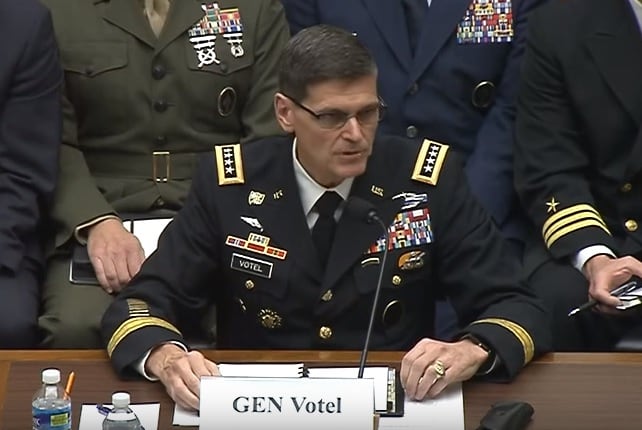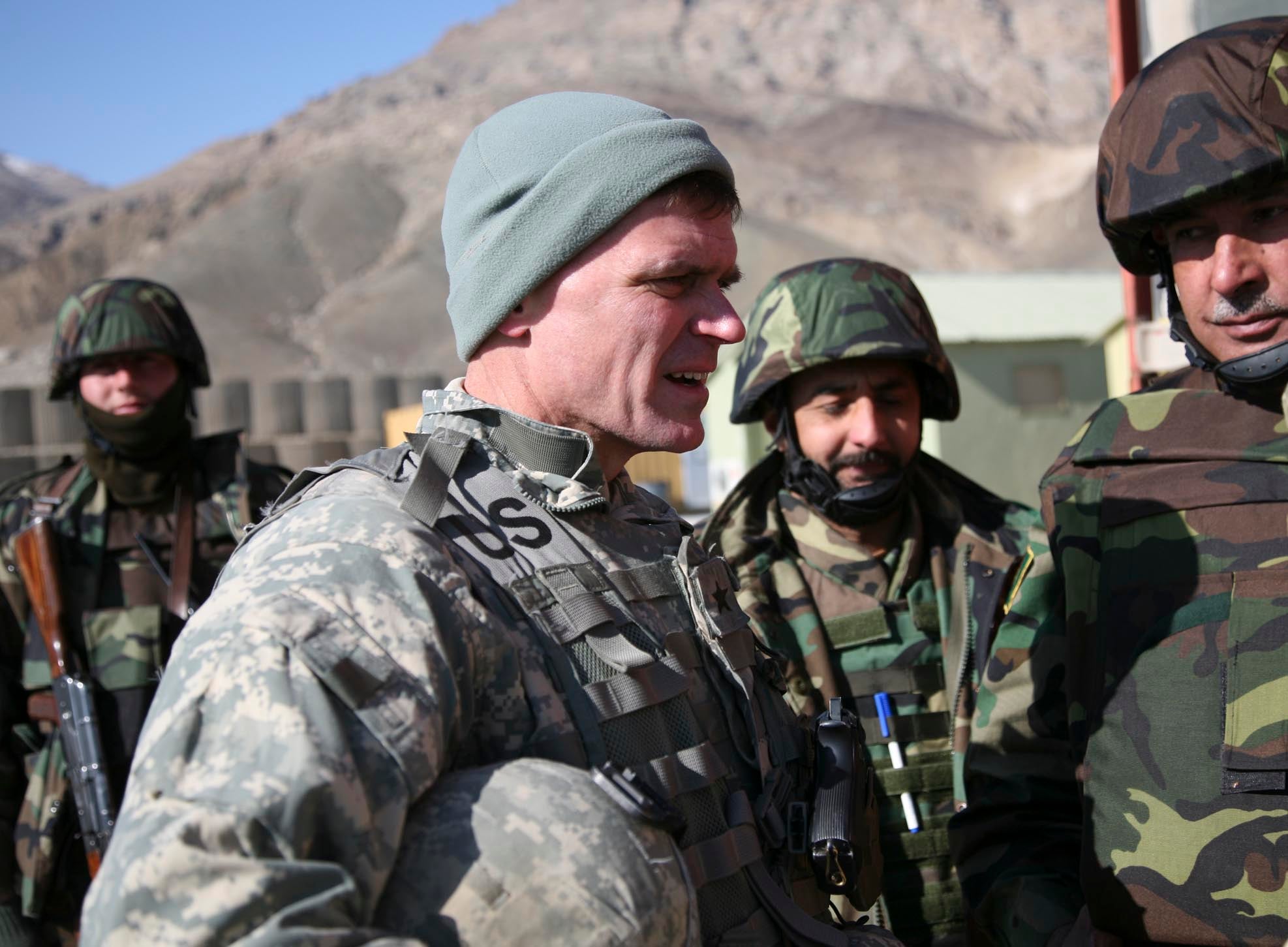It's no not a job for the fainthearted. As the next head of U.S. Central Command, The Senate on Thursday confirmed Army Gen. Joseph Votel, whom the Senate confirmed late Thursday, will assume oversight of to serve as the head of U.S. Central Command, handing him a the Pentagon post that overseas the most vexing military problems in the world today.

The list of crises that will consume filling Votel's attention his daily brief is long and laden with seemingly insurmountable challenges. He’ll oversee the multifaceted pronged war against the Islamic State group in Iraq and Syria. He’ll supervise the seemingly endless U.S. mission in Afghanistan. He'll also take over get the rarely discussed war operations backing Saudi Arabia's intervention in Yemen's civil war.
And Votel will he’ll have to deal with Iran, which he Votel himself has described as maybe the greatest "long-term threat" facing to the United States. Many experts believe that Iran could develop an operational nuclear weapon within just a few months if last year’s controversial nuclear deal falls apart.
And yYet the biggest challenge problem facing the general Votel may be Russia and the new threat it poses to the historic United States' historic dominance in the region.
"The first thing Votel has to figure out is whether he is facing an emerging Iran-Russian alliance whose goal is to push the U.S. out of the Middle East," said James F. Jeffrey, a former ambassador to Iraq. "That is a dramatic change of an almost epochal scale."
Votel, who most recently served as the head of U.S. Special Operations Command, will direct operations across a region that includes have an area of operations with more than 80,000 U.S. troops on the land and sea. CENTCOM's area of responsibility in a region that stretches from the eastern Mediterranean Sea all the way to the border with Pakistan.
Slated for a three-year tour, Votel arrives at CENTCOM as the region is embroiled in historic turmoil, perhaps more than any other time since the combatant command's inception in 1983. The United States' longstanding U.S. role in the region is uncertain. And many experts believe the basic map of the Middle East's borders may be fundamentally redrawn on Votel's watch. Indeed, Jeffrey said, he'll have to Votel must "get a grasp of the continuing disintegration of the state system in the region," Jeffrey said."
[[[I BEEFED UP THIS GRAPH TO OFFER SOME CONTEXT. LOOK OK?//A.deG.]]] To make matters more complicated worse, Votel doesn't know who his commander in chief will be come in January and how that individual will look to confront the various crises facing the U.S. Republican presidential candidates, citing conventional military threats posed by Russia and China, have vowed to regrow the military after years of rollbacks under President Obama. There's been little discussion of Afghanistan, however, and only mixed messages on how best to deal with the Islamic State. Some favor sending more American ground troops into Iraq and Syria, a move Obama has resisted, while one candidate, Texas Sen. Ted Cruz, made the unpopular suggestion that U.S. warplanes should begin carpet bombing ISIS.
The Democratic candidates have been less direct in how they view the military's role in addressing these issues. [[[FAIR?//A.deG.]]]
"All of the candidates have been extremely vague about what their policy is going be because it’s a nightmare" in the Middle East, said Joshua Landis, who the heads of the Center for Middle East Studies at the University of Oklahoma's Center for Middle East Studies. If anything, he added, the presidential campaign has revealed that many Americans have little-to-or no appetite for interest in more costly military missions there in the Middle East.
RLandis noted that Republican front-runner Donald Trump, Landis noted, gained strong support after declaring that the 2003 invasion of Iraq was "a horrible mistake" and "one of the worst decisions" in the nation's history of the country." "The rise of Trump is very much connected to the squandering of our national resources in a part of the world that Americans don’t care about," he Landis said. [[[ADDED THE FOLLOWING SENTENCE. OK?//A.deG.]]] At the same time, Trump has made controversial statements about the use of torture in pursuing terrorists linked to ISIS.
Internally, Votel also has some deep-seated problems to tackle at CENTCOM headquarters inside his own headquarters building in Tampa, Florida. The entire CENTCOM intelligence staff there is under scrutiny, and likely in disarray, amid allegations the command as a Pentagon inspector general's probe suggests intel that hard assessments about the ISIS threat were soft-pedaled its assessments to the White House. Last year the Defense Department Inspector General Pentagon’s inspector general opened an investigation into claims allegations that intelligence reports about the Islamic State and al-Qaida were being manipulated by senior officials, making initially grim conclusions grow rosier as they moved up the chain of command.
That's a major problem, said Mieke Eoyang, who heads the national security program at Third Way, a think tank in Washington. "If you can’t be confident in what you, as an organization, know to be true," she said, "then how can you reach consensus on everything else?" Eoyang said.
The ongoing IG investigation will make Votel’s job only more challenging harder. "It’s very difficult to come in and reform a system while the IG is still there trying to do an investigation," Eoyang said. "Internally he’s got some real challenges to deal with," Eoyang said.
Votel spent the past five years as a special operations commander, which should provide may give him unique special insight into the military capabilities that Washington the U.S. military is relying on more than ever. Yet in that role he that same job also was shrouded from public view, so Votel may be less familiar with the expectations very public role required of a geographical combatant commander.
"CENTCOM commanders," Eoyang said, "they have this diplomatic role which you don’t deal with when you are operating in the black. That’s going to be very different than what he’s done before," Eoyang said."
Diplomacy, especially in Iraq Bahgdad, will be key to defeating the Islamic State. The U.S. military needs approval from the Iraqi government for any expansion of the U.S. military mission there beyond the current force of about 3,800 troops. But strong support from the Iraqis is hard to secure these days because many blame the U.S. Americans for many of their current problems. If Iraqi Prime Minister Haider al-Abadi appears to be too cozy with the Americans, he risks seeing his own political support collapse.
"The United States has a really, really hugely negative image in Iraq. Abadi would probably like more U.S. help, but he has to balance what he says publicly. A lot of the Shia parties are totally anti-American," said Joel Wing, an Iraq analyst and author of the blog Musings on about Iraq. Plummeting oil prices — recently falling below $40 a barrel, down from a peak of over $110 just a few years ago — will intensify the region's instability.

Gen. Joseph Votel, seen here in Afghanistan in 2008, will take over at CENTCOM amid growing debate over U.S. force levels in that country.
Photo Credit: AP
In Afghanistan, Votel will soon be drawn into politically fraught decisions about the future U.S. mission there. The White House has been eager to draw down U.S. forces, limit their authorities and leave the fight against the Taliban up to the Afghan security forces.
But new gains by the Taliban last year prompted the departing four-star commander, Army Gen. John Campbell, to recommend expanding the U.S. air campaign. Many military leaders are skeptical of Obama's current plans to cut today's force of about 9,800 American troops in Afghanistan to about 5,500 by the end of the year.
As Votel takes over at CENTCOM, those decisions remain pending at the highest levels of the Pentagon and White House.
But today CENTCOM is no longer Washington's dominant global focus, as it was for more than 20 years. A resurgent Russia has drawn attention — and combat power — to U.S. European Command. China's rise North Korea's nuclear threats are further straining U.S. Washington's resources and energy.
"As the head of U.S. Central Command, Votel is going to have to deal with this nightmare himself, without the kind of political leverage he'll need," Landis said. The short-term goal of defeating and destroying the Islamic State will not be easy, he added. "He’s got to dig in and realize there is not going to be an occupying army. There are not going to be partners in the region. He’s in it for the long haul, just pounding away without being able to destroy them. It’ll be this sort of drone-warfare-forever under his watch," Landis said."
Andrew Tilghman is the executive editor for Military Times. He is a former Military Times Pentagon reporter and served as a Middle East correspondent for the Stars and Stripes. Before covering the military, he worked as a reporter for the Houston Chronicle in Texas, the Albany Times Union in New York and The Associated Press in Milwaukee.





